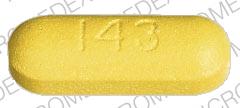Carbenicillin Dosage
Applies to the following strengths: 382 mg
Usual Adult Dose for:
Additional dosage information:
Usual Adult Dose for Cystitis
382 to 764 mg (1 to 2 tablets) orally 4 times a day for 3 to 7 days (Escherichia coli, Proteus, or Enterobacter as causative agent).
764 mg (2 tablets) orally 4 times a day for 3 to 7 days (Pseudomonas or Enterococcus as causative agent).
Usual Adult Dose for Prostatitis
764 mg (2 tablets) orally 4 times a day for 14 days. Chronic prostatitis may require 1 to 3 months of antimicrobial therapy.
Renal Dose Adjustments
CrCl 10 to 50 mL/min: 382 to 764 mg orally every 12 to 24 hours.
CrCl<10 mL/min: Use not recommended because of inadequate urinary concentrations.
Liver Dose Adjustments
No adjustment recommended
Precautions
Serious and occasionally fatal hypersensitivity reactions have been reported with antibiotics. The drug should be discontinued immediately at the first appearance of a skin rash or other signs of hypersensitivity. Severe, acute hypersensitivity reactions may require treatment with adrenaline and other resuscitative measures including oxygen, intravenous fluids, antihistamines, corticosteroids, cardiovascular support and airway management as clinically indicated.
Clostridium difficile associated diarrhea (CDAD) has been reported with almost all antibiotics and may potentially be life-threatening. Therefore, it is important to consider this diagnosis in patients who present with diarrhea following carbenicillin therapy. Mild cases generally improve with discontinuation of the drug, while severe cases may require supportive therapy and treatment with an antimicrobial agent effective against C difficile. Hypertoxin producing strains of C difficile cause increased morbidity and mortality; these infections can be resistant to antimicrobial treatment and may necessitate colectomy.
Dose reductions are recommended in patients with severe renal impairment (creatinine clearance less than 20 mL/min). Carbenicillin will not reach adequate urine concentrations in patients with creatinine clearance less than 10 mL/min.
Superinfection with nonsusceptible organisms (i.e., yeasts) may occur with prolonged therapy.
Periodic monitoring of renal and hematologic function is recommended during prolonged therapy.
To reduce the risk of development of drug-resistant organisms, antibiotics should only be used to treat or prevent proven or suspected infections caused by susceptible bacteria. Culture and susceptibility information should be considered when selecting treatment or, if no data are available, local epidemiology and susceptibility patterns may be considered when selecting empiric therapy. Patients should be advised to avoid missing doses and to complete the entire course of therapy.
Dialysis
Use not recommended because of inadequate urinary concentrations.
More about carbenicillin
- Check interactions
- Compare alternatives
- Side effects
- During pregnancy
- Drug class: antipseudomonal penicillins
Related treatment guides
See also:
Further information
Always consult your healthcare provider to ensure the information displayed on this page applies to your personal circumstances.


